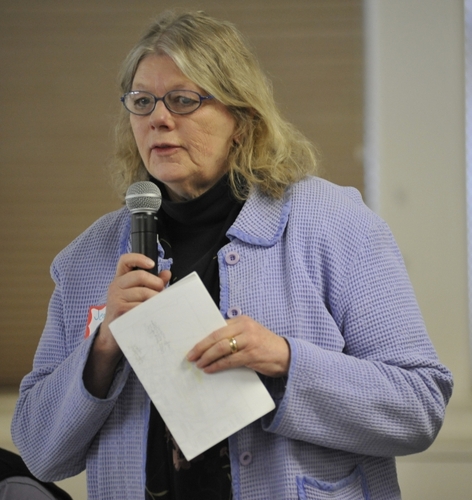BRATTLEBORO — Most know that the economy of Chittenden County in general, and Burlington in particular, is doing better than Vermont as a whole.
But a chart from the Vermont Department of Labor that was making the rounds at the Brattleboro Area Chamber of Commerce's Legislative Breakfast on Monday illustrated how much better Burlington is doing.
The chart shows the percentage of change in total non-farm employment in Vermont from the start of the 2007-08 recession in June 2007 to December 2014. There are three lines on the chart representing the total Vermont rate, Burlington, and Vermont excluding Burlington.
All three lines nosedived together until June 2009, the start of the Obama administration's economic stimulus program.
From that point on, the Burlington line shows steady growth, peaking at just over 4 percent higher than June 2007 by the end of the graph in December 2014.
Take out Burlington, and the rate of change in employment in the rest of the state bottomed out at 6 percent below the June 2007 peak as of January 2010. It remains about 2 percent lower that the 2007 peak as of the end of 2014.
State Rep. Tristan Toleno, D-Brattleboro, who provided the chart, said that “it says a lot about where we are at as a state. The Burlington economy is self-sustaining, but the rest of the state is not.”
That is especially the case for rural Vermont, said Rep. Ann Manwaring, D-Wilmington, especially when it comes to education spending.
Manwaring, who serves on the House Education Committee, presented a map from the Education department showing the school districts that have seen a 50 percent or greater decline in enrollment over the past 20 years.
Every district in Windham County saw steep declines, and every district in the county had a student-to-teacher ratio of 11-to-1 or less.
“It's not rich versus poor school districts anymore,” said Manwaring. “It's large school districts versus small districts.”
First-year Rep. Emily Long, D-Newfane, who serves with Manwaring on the Education Committee, agreed.
Long, who is also a member of the Newfane School Board, said she is a “believer in maintaining a strong public education system” but that system is being threatened “mostly by declining enrollments.”
With Vermont facing a large budget deficit for fiscal year 2016, there is a lot of competition for state dollars.
Sen. Jeanette White, D-Windham, said that “everything is now on the table” in budget negotiations as the Legislature enters the second half of this year's session.
“We're looking at both short-term and long term cuts, and we're looking at how we organize government to be more efficient,” White said. “It's not pretty.”
A sluggish economy, ever-increasing education costs, and a growing state deficit were all reasons why the talk at the March 16 Legislative Breakfast at the Brattleboro Retreat was dominated by economic development issues.
First-year state Sen. Becca Balint, D-Windham, spoke of the need to step up efforts to attract young people to live and work in Vermont. She is on the Senate Commerce Committee.
First-year state Rep. Laura Sibilia, I-West Dover, and third-term Rep. Valerie Stuart, D-Brattleboro, are both on the House Commerce and Economic Development Committee.
Sibilia said one of her priorities for the session is to keep funding for tourism and marketing Vermont in the state budget.
Brattleboro Development Credit Corp. president Dan Normandeau said he was “absolutely thrilled” that the county's legislative delegation “is using the two words near and dear to my heart, economic development.”
Normandeau suggested that any bill considered by the Legislature “be vetted for its impact on economic development” and said every state agency should have economic development as a big part “of its decision matrix.”
Phil Steckler, a Brattleboro-based business broker, said he was concerned that the Legislature “has no idea how to reduce the budget deficit,” and warned lawmakers not to resort to tax increases.
“If we keep raising taxes, we will continue to export our people out of this state,” he said.
Chamber Executive Director Kate O'Connor also expressed concern about taxation, in particular a proposed 0.7 percent employer payroll tax to pay for health care.
“Any kind of new tax on businesses right now is not helpful,” she said.
